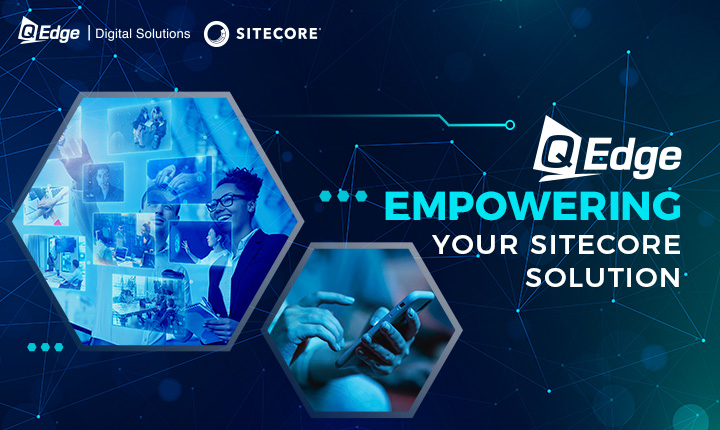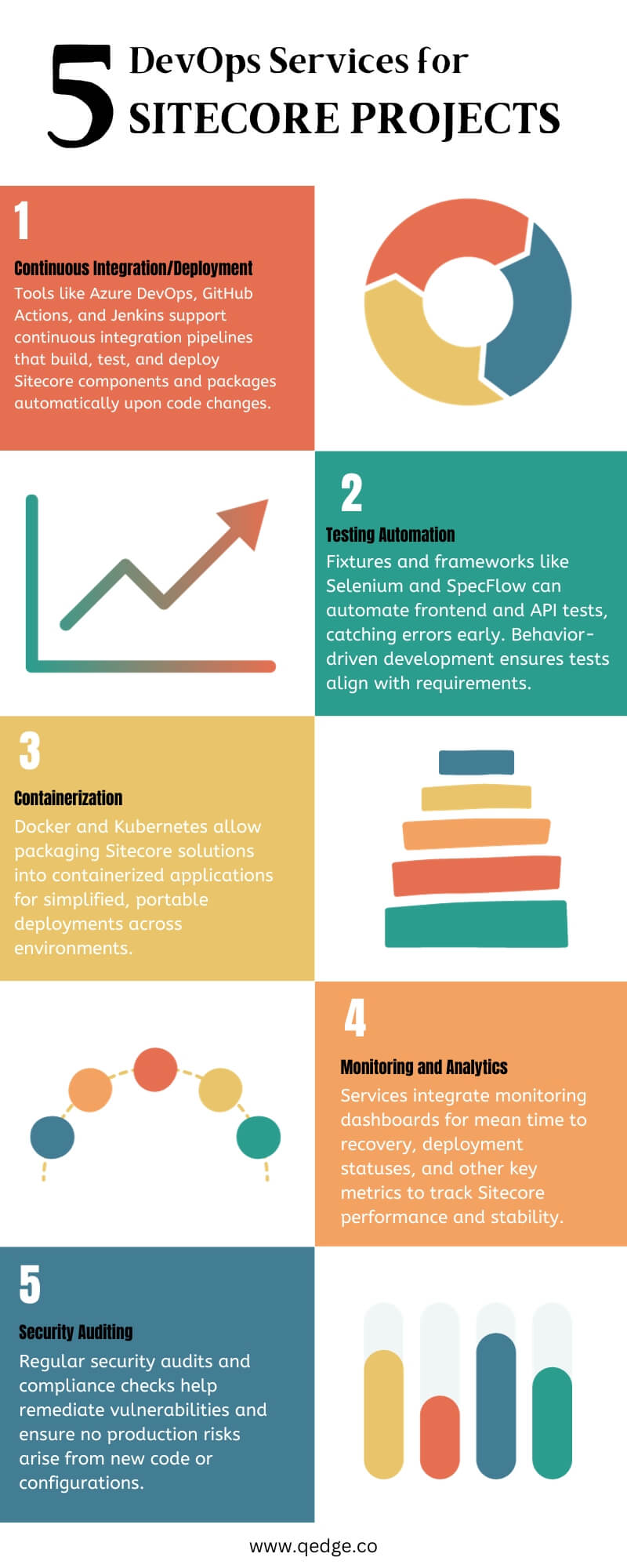What does "DevOps service for Sitecore" mean for organizations? Well, they need to be able to deliver new features and fixes to their Sitecore solutions quickly while maintaining stability and security.
The DevOps methodology aims to address this need through a culture of collaboration between development and operations teams. When implemented properly for Sitecore, DevOps can help reduce lead times, automate processes, and get valuable software deployments into users' hands faster.

QEdge will explore how DevOps improves the software development lifecycle (SDLC) for Sitecore projects. We will outline some common DevOps services that Sitecore agencies offer, as well as best practices for implementing certain techniques.
What is DevOps for Sitecore?
DevOps refers to both a set of practices as well as a software development philosophy focusing on collaboration and automation.
When applied to Sitecore, the main goals of DevOps include:
- Faster release cadences through continuous integration and deployment
- Increased deployment frequency from days/weeks to hours/minutes/seconds
- Earlier feedback on potential issues through automated testing
- Minimizing security and compatibility risks for each release
- Standardizing and documenting environments and processes
This is achieved by having development, testing, and operations teams work together throughout all phases of the SDLC. They share ownership of the code, use tools to monitor production environments, and receive immediate feedback on how changes affect the overall system.
Common DevOps Services for Sitecore Projects
Many Sitecore agencies offer specialized DevOps services and consulting to establish processes that streamline Sitecore delivery.

Some of the most common include:
Automation: The Key to Consistency
One of the cornerstones of DevOps is automation. By leveraging tools like Terraform and Pulumi, teams can automate the provisioning of servers and environments in cloud platforms such as AWS and Azure. This infrastructure-as-code approach ensures consistent and repeatable deployments across environments.
But automation doesn't stop there. Continuous integration and deployment (CI/CD) pipelines, powered by tools like Azure DevOps, GitHub Actions, and Jenkins, enable automatic building, testing, and deployment of Sitecore components and packages whenever code changes occur.
This saves time and reduces the risk of manual errors.
Testing: Catching Issues Early
Another key aspect of DevOps is automated testing. By incorporating testing frameworks like Selenium and SpecFlow, teams can automate frontend and API tests to catch errors early in the development process. Adopting behavior-driven development (BDD) practices ensures that tests align with business requirements, providing a shared understanding between developers, testers, and stakeholders.
Continuous testing cycles run with each code change, allowing teams to surface and address issues promptly. This proactive approach minimizes the chances of bugs slipping into production.
Containerization: Simplifying Deployments
Containerization technologies like Docker and Kubernetes have revolutionized the way applications are packaged and deployed. By encapsulating Sitecore solutions into containerized applications, teams can simplify deployments across different environments. Containers provide portability and consistency, making it easier to manage and scale Sitecore implementations.
Monitoring and Security: Ensuring Stability and Compliance
DevOps isn't just about development and deployment; it also encompasses monitoring and security. Integrating monitoring dashboards allows teams to track key metrics such as mean time to recovery, deployment statuses, and performance indicators. This visibility helps identify and resolve issues quickly, ensuring a stable and performant Sitecore platform.
Regular security audits and compliance checks are essential to maintain the integrity of Sitecore solutions. By proactively identifying and remediating vulnerabilities, teams can mitigate production risks arising from new code or configurations.
Embracing DevOps Best Practices
While specific DevOps services are valuable, adopting best practices is equally important. Storing infrastructure and configuration details as code in repositories alongside application components ensures consistency between pre-production and production environments.
Why Partner with QEdge for DevOps?
For organizations adopting or improving DevOps processes for Sitecore, working with an experienced agency offers clear advantages over going it alone or relying solely on in-house resources.
As a reliable Sitecore agency, QEdge provides end-to-end DevOps services and guidance.

Some key benefits of partnering with QEdge include:
- Team of Sitecore certified developers, architects, and consultants
- Proven methodologies and accelerators for scaffolding DevOps pipelines
- Flexible resourcing options from dedicated DevOps teams to project consulting
- Mature DevOps practices are already in place for clients to model after
- Guidance on tools, techniques, and best practices from established experts
- Managed DevOps services available to avoid the overhead of building in-house
By leveraging QEdge's DevOps expertise, clients gain accelerated learning curves, optimized processes, and focal points for improvement from the start. Teams access proven pipelines, documentation, and on-demand support to establish advanced Sitecore delivery models. Overall, partnering elevates DevOps maturity faster at lower costs versus building solutions in isolation.
Conclusion
In summary, adopting a DevOps approach transforms how organizations develop and deliver Sitecore solutions. When implemented through an experienced DevOps partner, clients streamline processes to maximize productivity across all functions.
Automating manual tasks, engaging in continuous integration/delivery, and establishing production-grade tools and services elevate delivery speed, quality, and visibility for Sitecore implementations. QEdge offers a strategic DevOps partner fully dedicated to the Sitecore ecosystem.

